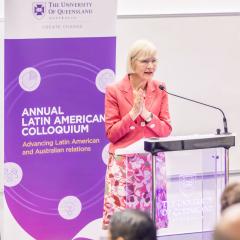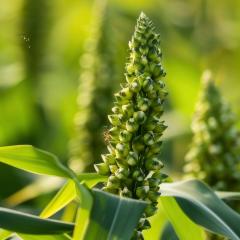The sustainable manufacture of bio-based herbicides is the target of a $1.3 million international collaboration initiated by the Global Bioeconomy Alliance (GBA).
The University of Queensland is one of the founding members of the GBA, alongside the Technical University of Munich, the Danish Technical University and the São Paulo State University in Brazil.
Professor Robert Henry from UQ’s Queensland Alliance for Agriculture and Food Innovation said the aim was to produce agricultural chemicals from biological sources.
“At the moment agricultural chemicals, such as insecticides, pesticides and fungicides, are produced predominantly from non-renewable starting materials, adding considerably to the carbon footprint of the sector,” Professor Henry said.
“We want to make them from renewable, biological sources instead.
“Sugarcane bagasse, for instance, is the pulp left behind after the juice of the sugarcane plant is harvested.
“It is an excellent renewable raw material for the production of chemicals.
“Part of the decarbonisation strategy for agriculture is to replace fossil carbon with carbon produced in plants as a source of herbicides and other chemicals.”
Biochemist Professor Gary Schenk from UQ’s School of Chemistry and Molecular Biosciences will work with colleagues in Munich to establish a process to convert sugarcane bagasse to a recently discovered natural herbicide.
This herbicide, a carbohydrate, was shown to have herbicidal properties similar to those of the commercial herbicide glyphosate.
“The idea is to establish a sustainable manufacturing platform for such compounds,” Professor Schenk said.
“We want to make bio-based molecules with bio-based processes.
“Specifically, in this project, we will use synthetic biology tools to produce this natural herbicide as a proof-of-concept.”
Professors Henry and Professor Yasmina Sultanbawa will identify novel naturally occurring molecules with herbicidal activity.
In partnership with Bushtukka and Botanicals Indigenous Enterprise Cooperative, Professor Sultanbawa will identify native plants that have known pesticidal properties and develop screening assays for bioactivity.
“We will screen Queensland biodiversity for naturally occurring bioactives that we can find in plants,” Professor Henry said.
“Our partners in Germany will then help us define the active ingredients in our biological resources.
“The new bioactives that we discover will then be produced using the same manufacturing platform established in our proof-of-concept test system.
“It’s a real circular economy opportunity for agriculture fulfilling UQ’s and the GBA’s objective of creating impact.”
Read full article on QAAFI News
The Technical University of Munich (TUM) is one of UQ's flagship partners. UQ and TUM foster innovation and entrepreneurial minds to meet the future-focused needs of a transforming world.



